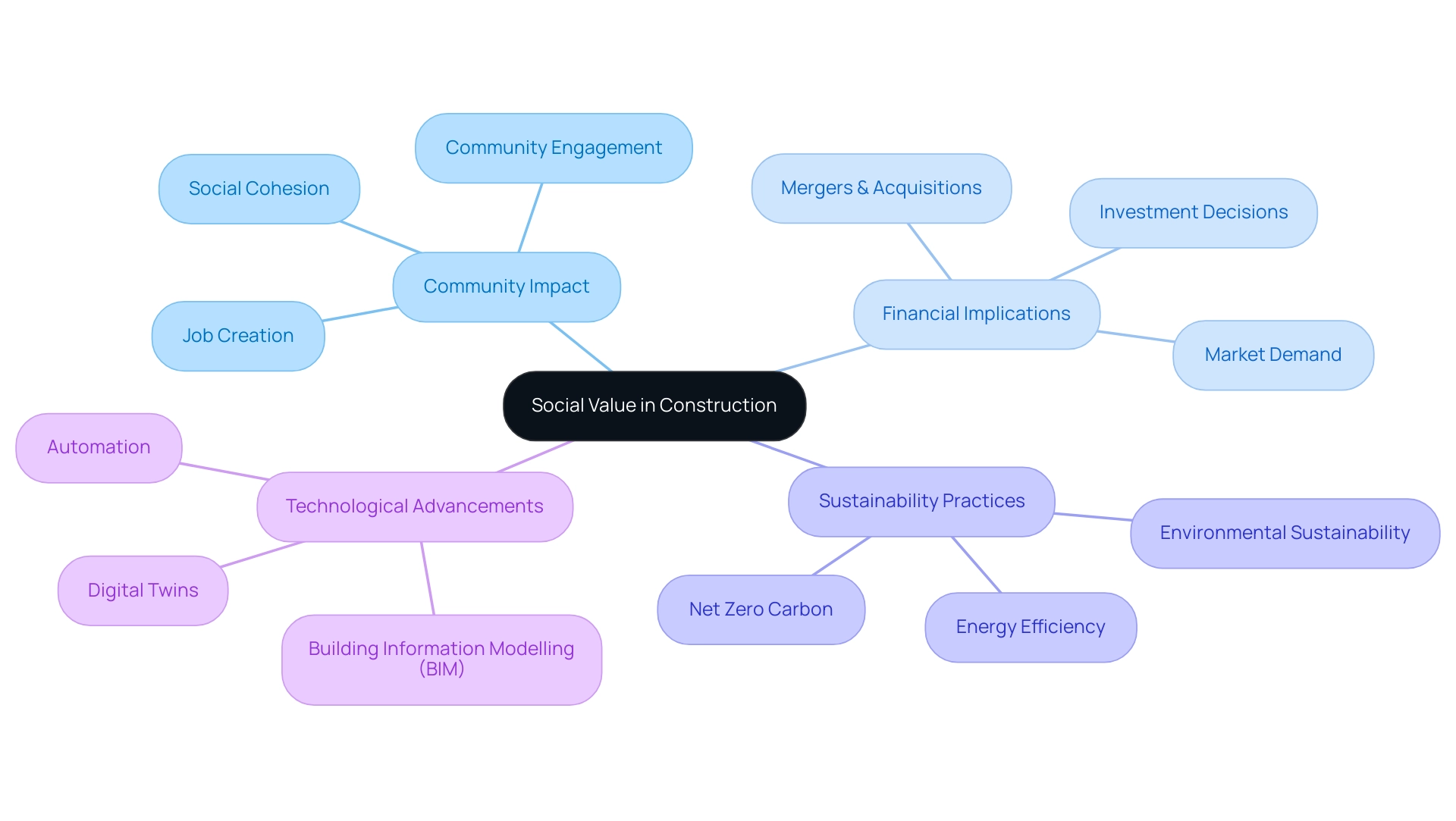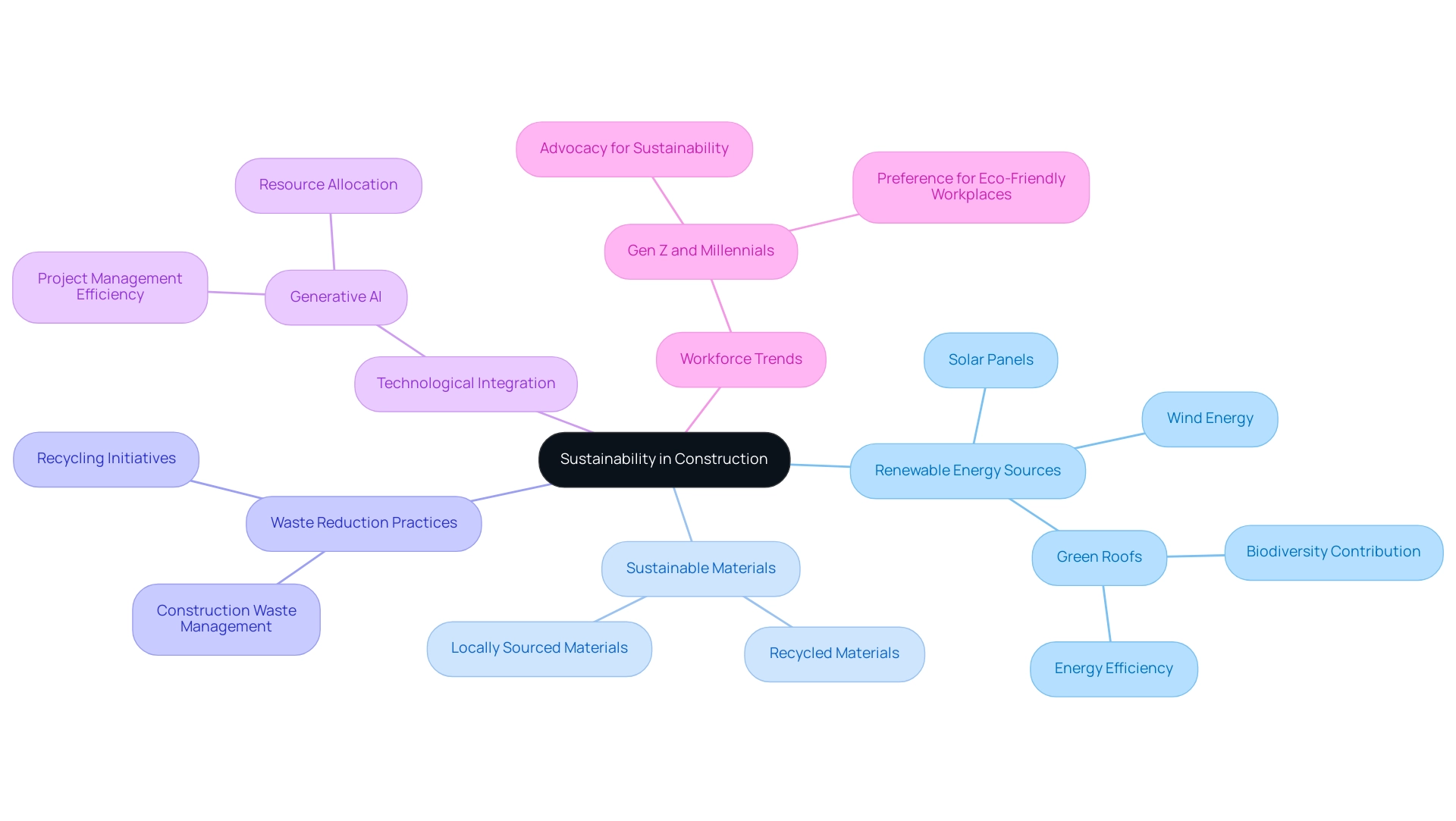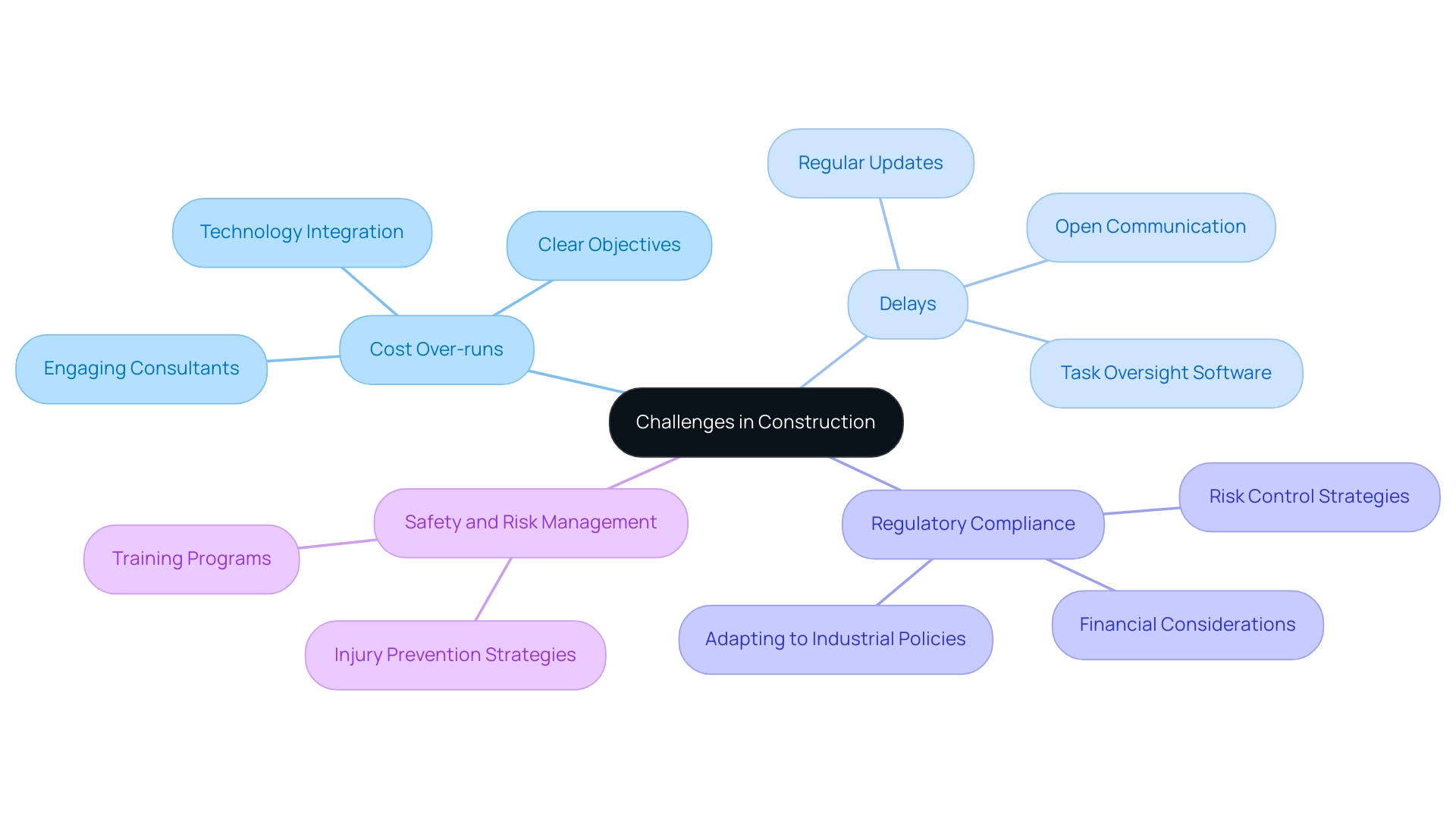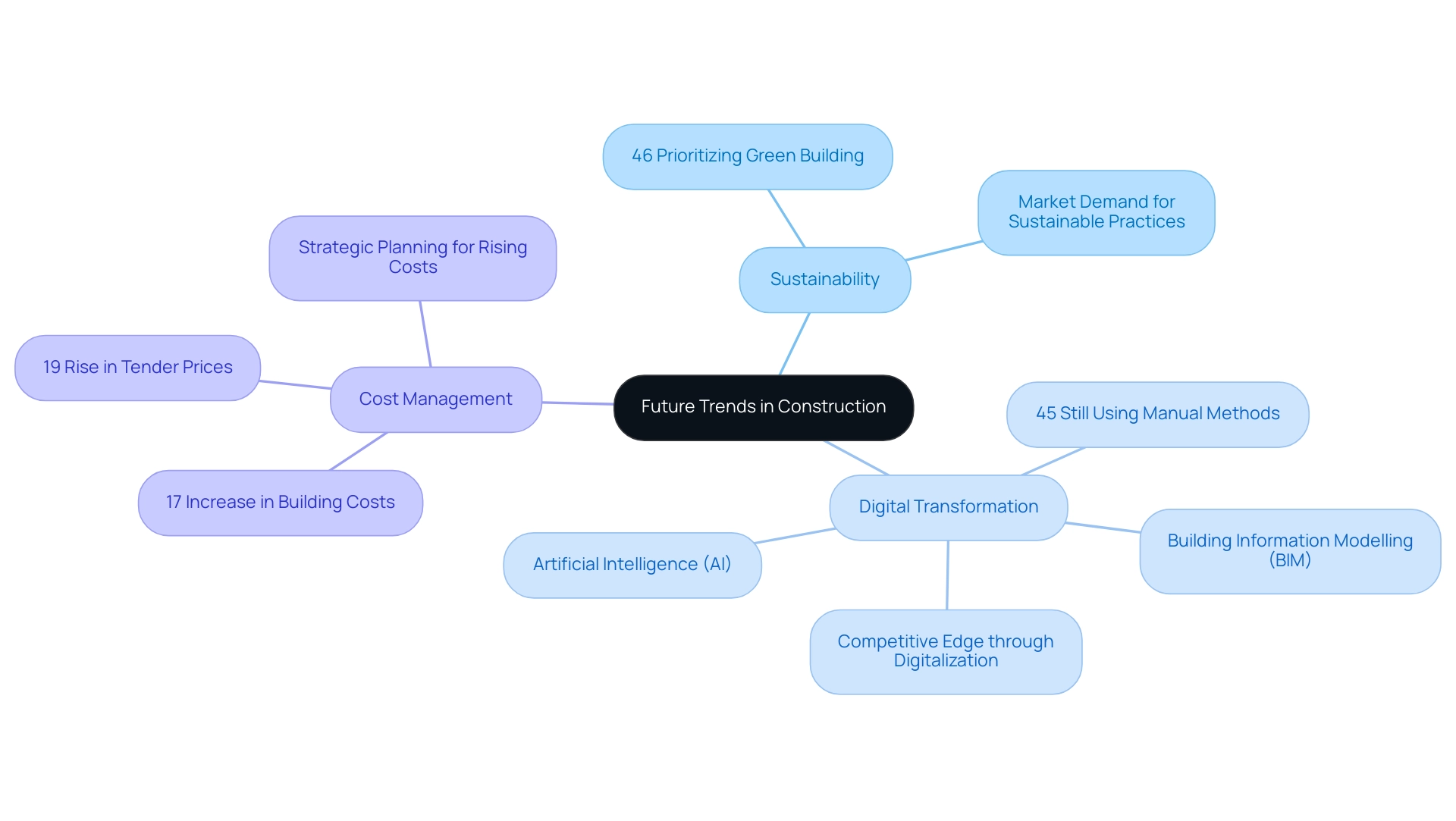27 Mar 2025
BlogOverview
Construction insights are vital for developers as they navigate the complexities of market dynamics, regulatory changes, and technological advancements. These insights ultimately enhance project efficiency and foster innovation. By leveraging data analytics and remaining informed about industry trends, developers can significantly improve their decision-making processes, optimise resource allocation, and manage costs effectively. This strategic approach positions developers advantageously within a competitive landscape, enabling them to thrive amidst challenges.
Introduction
In a rapidly evolving construction landscape, developers confront a dual challenge: adapting to technological advancements while prioritising sustainability and social value. As the industry transitions towards innovative practices such as modular construction and data-driven decision-making, grasping the intricate dynamics of market trends becomes essential for success.
With a projected increase in building costs and an escalating emphasis on community impact, developers must navigate the complexities of project management while leveraging expert insights to enhance efficiency and environmental responsibility.
This article delves into key strategies and emerging trends shaping the future of construction, providing a roadmap for developers aiming to thrive in a competitive market.
Understanding Construction Insights: The Key to Successful Development
For builders, construction insights are not merely beneficial; they are essential. These insights encompass a variety of data and trends that illuminate market dynamics, regulatory shifts, and technological advancements. Staying informed about construction insights enables developers to pinpoint opportunities for innovation and efficiency within their projects. For instance, the integration of data analytics significantly enhances decision-making processes, facilitating improved resource allocation and cost management.
In 2024, the construction industry experienced a notable 10% increase in nominal value added. This statistic underscores the importance of leveraging data to navigate this evolving landscape effectively.
Edmond Shipway encourages developers to actively engage with industry reports, attend seminars, and participate in professional networks to remain current with these insights. Case studies illustrate the transformative impact of data analytics on management. For example, the adoption of advanced technologies such as drones for surveying and augmented reality for training has proven to enhance efficiency, safety, and data management on job sites. As emphasised in the case study titled “Emerging Technologies in Construction,” these innovations are essential for the future delivery of work.
By embracing construction insights and trends, developers can not only enhance their strategies but also position themselves advantageously in a competitive market.
Edmond Shipway’s comprehensive consultancy services, concentrating on management, cost efficiency, and sustainability, are crucial for addressing these challenges across various sectors, including hospitality and healthcare.
The Role of Social Value in Construction: Enhancing Community Impact
Social value in construction encompasses the significant impact that initiatives have on local communities, including job creation, environmental sustainability, and the promotion of social cohesion. In 2025, the emphasis on social value has become increasingly pronounced, with creators recognising the necessity of engaging local stakeholders for successful outcomes. By integrating community feedback into their designs, developers can ensure that their initiatives provide tangible benefits for residents, thereby enhancing the overall social value of their efforts.
For example, hospitality development projects can substantially increase their social value by incorporating public spaces or facilities that address community needs. This strategy not only enriches the local environment but also enhances its attractiveness to investors, who are progressively prioritising social impact alongside financial returns. Edmond Shipway’s comprehensive consultancy services in construction focus on project management and cost efficiency, ensuring that such developments are both sustainable and beneficial to the community.
Our Mechanical and Electrical Consultants specialise in building services, with a strong emphasis on energy efficiency and the reduction of CO2 emissions, further contributing to the social value of projects.
Recent forecasts from Experian predict a decline in total construction output by 1.1% in 2024, followed by expected growth in subsequent years, particularly in new housing and repair sectors, offering valuable insights into construction trends. This recovery presents an opportunity for creators to enhance community influence through meticulous planning and execution.
As these sectors grow, developers can harness this momentum to establish initiatives that align with community needs and aspirations, supported by Edmond Shipway’s expertise in sustainable solutions aimed at achieving a Net Zero Carbon future.
To further underscore the importance of social value, consider the insights provided by industry experts. A proactive approach not only addresses regulatory compliance but also bolsters employer branding, making companies more appealing to prospective talent.
Additionally, B2B marketing can play a crucial role in helping firms navigate challenges by demonstrating their agility in regulatory compliance and showcasing their commitment to social value. Moreover, advancements in technology, such as Building Information Modelling (BIM), digital twins, and automation, are expected to modernise the building sector, enhancing productivity and resource allocation, which can further elevate social value outcomes.
In conclusion, the impact of development initiatives on local communities in 2025 is profound. By prioritising community engagement and social value, builders can create initiatives that not only meet market demands but also enrich the social fabric of the regions they serve, with Edmond Shipway leading the way in providing construction insights and tailored consultancy solutions across various sectors, including our heritage in cost consultancy.

Innovative Construction Practices: Embracing Modular Solutions
Modular building represents a transformative approach in the construction industry by utilising prefabricated components assembled on-site. This method not only accelerates project completion but also significantly reduces waste, providing crucial insights for those seeking to enhance efficiency and sustainability. In 2025, it is evident that the advantages of modular solutions are more pronounced than ever, especially in the hospitality sector, where speed and cost-effectiveness are paramount.
For example, modular hotels can be constructed in a fraction of the time compared to traditional methods, often leading to a quicker return on investment. This rapid construction timeline offers valuable insights for developers eager to seize market opportunities without incurring excessive delays. Furthermore, modular building minimises disruptions to local communities, enabling businesses to maintain operations and residents to continue their daily routines with minimal interference.
Statistics indicate that adopting modular building can reduce project timelines by up to 50%, particularly beneficial within the context of the UK Government’s £11.5 billion Affordable Homes Programme aimed at addressing housing shortages. Additionally, the necessity for strategic coordination in implementing Modern Methods of Construction (MMC) has been underscored, especially in light of recent challenges faced by modular builders, including the collapse of some companies. This highlights the importance of a well-planned approach to ensure successful implementation and the need for government intervention.
The Building Safety Act is vital legislation that imposes specific requirements on duty holders regarding the safety and integrity of structures. Underscoring the critical nature of safety considerations in modular building as the industry evolves.
Moreover, modular building provides essential insights, not only benefiting the hospitality sector but also serving as an excellent alternative for educational institutions needing to create new classrooms without disrupting current operations. Successful case studies from Edmond Shipway in the hospitality sector illustrate the effectiveness of modular building. Numerous hotels have been completed using modular techniques, showcasing both the speed of construction and the high quality of the finished product.
These initiatives, including the £18.5 million endeavour and the £252 million venture, demonstrate that prefabrication can meet the rigorous standards expected in hospitality, offering developers essential insights as a reliable alternative to conventional building methods.
Edmond Shipway’s expertise in management and cost consultancy is evident in these successful implementations, showcasing their tailored consultancy services across diverse sectors, including hospitality, healthcare, and education. Expert opinions reinforce the insights that highlight the advantages of modular building.
Industry leaders assert that this method addresses current labour shortages, projected to require an additional 252,000 workers by 2028, and offers critical insights by reducing the carbon footprint associated with traditional building practices. As emphasised in a report by Skills England, there is an urgent need for reskilling and expanding the workforce in the sector to meet the industry’s growing demands. As programmers navigate the complexities of contemporary building, adopting modular solutions can lead to improved project efficiency and substantial long-term benefits.
Sustainability in Construction: Strategies for Developers
Sustainability in building has become increasingly vital, with a strong focus on resource efficiency and minimising environmental impact. Developers can adopt a variety of strategies to enhance sustainability, including:
- The use of renewable energy sources
- Selection of sustainable materials
- Implementation of waste reduction practices
For instance, integrating green roofs not only contributes to biodiversity but also improves energy efficiency by providing natural insulation.
Energy-efficient systems can significantly lower a building’s carbon footprint, aligning with the growing demand for eco-friendly solutions. As the construction landscape evolves, staying informed about sustainability regulations is crucial for builders. Compliance not only reduces risks but also enhances attractiveness to environmentally conscious clients. Recent trends indicate that a significant portion of the workforce, particularly Gen Z and Millennials, prioritise sustainability in their professional environments.
This demographic shift is prompting businesses to embrace sustainable practices, making it vital for creators to align their initiatives with these values to attract and retain talent. A case study titled “Younger Generations Drive Change: The Influence of Gen Z and Millennials” highlights this impact, showing that many young professionals advocate for sustainability practices within their workplaces.
Moreover, the integration of renewable energy in construction endeavours is gaining momentum. By leveraging solar panels, wind energy, and other renewable sources, developers can reduce reliance on fossil fuels and contribute to a Net Zero Carbon future. Expert insights suggest that the adoption of generative AI technologies will further support sustainability efforts, enabling more efficient project management and resource allocation.
Successful execution of sustainability strategies in building not only meets regulatory requirements but also positions project leaders as pioneers in the industry. By concentrating on innovative methods and renewable energy sources, creators can establish initiatives that resonate with contemporary values and contribute positively to the environment.

Navigating Challenges in Construction: Insights for Developers
Developers frequently face significant challenges in their building projects, such as cost over-runs, delays, and regulatory compliance issues. In 2025, the building sector continues to confront these challenges, with statistics revealing that cost over-runs persist as a major concern.
To effectively navigate these obstacles, it is essential to establish clear objectives. This clarity aligns all stakeholders, ensuring that everyone is working toward a common goal.
Open communication with stakeholders is another vital factor. Regular updates and discussions can prevent misunderstandings and foster collaboration, which is crucial for success. Additionally, implementing robust risk control strategies is imperative; identifying potential risks early enables proactive measures to mitigate them.
The integration of technology into task oversight practices has proven beneficial. For example, utilising software for task organisation allows developers to monitor progress in real time, facilitating the early detection of potential delays. The building market is currently experiencing steady growth, significantly driven by the increasing adoption of digital solutions such as Building Information Modelling (BIM). This technology enhances organisation and asset oversight, ultimately leading to more efficient project execution.
Engaging with experienced consultants like Edmond Shipway can also provide invaluable insights into best practices for overcoming common challenges. Their expertise in multi-sector consultancy services can assist professionals in implementing strategies that address labour mismatches and financial considerations, which are critical in today’s evolving building landscape. For instance, the case study titled “Impact of Technology on Building” illustrates how the integration of technology is driving growth and efficiency in the building market.
By focusing on these strategies, developers can not only address challenges but also enhance their outcomes, paving a smoother path to success in the competitive building industry.

Project Management and Cost Consultancy: Ensuring Project Success
Efficient oversight and cost consultancy stand as pivotal components of the construction process, particularly in hospitality development, where construction insights are indispensable due to high stakes and tight timelines. Developers must prioritise the hiring of seasoned managers capable of expertly navigating all phases of an initiative, from initial planning through to execution. This strategic oversight is paramount, as 91% of professionals recognise that their organisations encounter significant challenges related to management.
Engaging cost consultants, such as those at Edmond Shipway, further amplifies success by delivering essential construction insights into budgeting, resource allocation, and financial forecasting. Our comprehensive cost consultancy services emphasise integrating energy efficiency and CO2 reduction, identifying potential savings while empowering developers to make informed decisions that enhance viability. Indeed, organisations that weave cost consultancy into their initiatives frequently experience improved outcomes.
The emergence of digital management tools has revolutionised the landscape, with 61% of management professionals now working remotely at least part of the time. This shift towards hybrid approaches, adopted by 37% of construction teams, offers increased flexibility but also introduces unique challenges, especially in sectors like hospitality where in-person collaboration remains vital. Consequently, the role of management in ensuring timely and successful delivery cannot be overstated.
In 2025, the integration of cost consultancy into construction ventures is more critical than ever for acquiring valuable construction insights. By leveraging construction insights from Edmond Shipway’s cost advisors, including our Mechanical and Electrical Consultants who focus on energy efficiency and CO2 reduction, stakeholders can adeptly navigate the complexities of execution while adhering to budgetary constraints. This partnership not only enhances results but also positions developers as proactive leaders in the competitive hospitality sector, ultimately driving success and client satisfaction.
Future Trends in Construction: What Developers Need to Know
The building sector is experiencing a significant transformation, propelled by advancements in technology and an increasing emphasis on sustainability. Key trends such as digital transformation, modular construction, and the integration of innovative practices are yielding valuable construction insights that fundamentally reshape the conception and execution of initiatives. Developers must remain attuned to these changes, particularly the adoption of technologies like Building Information Modelling (BIM) and artificial intelligence, which have been proven to enhance project efficiency and accuracy.
Looking ahead to 2025, statistics reveal that 46% of companies in the UK are prioritising green building initiatives, reflecting a broader market demand for sustainable practices. This shift not only aligns with environmental goals but also positions creators to meet the expectations of an increasingly eco-conscious clientele. Furthermore, the BCIS Construction Industry Forecast anticipates a 17% increase in building costs and a 19% rise in tender prices over the next five years. This underscores the critical importance of strategic planning and cost management in navigating these challenges. The forecast highlights the necessity for hospitality developers to adapt their strategies to mitigate rising costs while consistently delivering high-quality, sustainable projects.
Digital transformation is not merely a trend; it provides essential construction insights that are critical for success in the building sector. Estimates highlight that 45% of construction organisations still rely on manual methods, emphasising the urgency for companies to embrace digital tools. Those who utilise technology are likely to gain a competitive advantage, with projections indicating they will surpass their peers in delivery and client satisfaction, thereby offering critical construction insights.
As the industry evolves, grasping these future trends will be crucial for hospitality creators seeking to excel in the market and attract a diverse clientele. This is particularly important as they navigate the complexities of sustainable construction practices and gain valuable insights for expense oversight. Edmond Shipway’s comprehensive consultancy services are designed to support developers in these areas, offering tailored solutions that enhance project management and cost efficiency while prioritising sustainability.

Conclusion
In a construction landscape marked by rapid change, developers must prioritise the integration of technology, sustainability, and social value to thrive. Leveraging construction insights and data analytics enables developers to identify opportunities for innovation and efficiency, ultimately enhancing project outcomes. The shift towards modular construction presents a significant advantage, facilitating faster project completion and reduced waste, aligning seamlessly with the industry’s growing focus on sustainability.
Moreover, the emphasise on social value underscores the importance of engaging with local communities and stakeholders. Developers who prioritise social impact alongside financial returns can create projects that resonate with community needs, thereby enhancing their attractiveness to investors. As the construction industry continues to evolve, adapting to trends such as digital transformation and the adoption of innovative practices will be crucial for success.
Navigating the complexities of project management and cost consultancy remains paramount. By employing experienced project managers and cost consultants, developers can effectively tackle challenges such as cost overruns and regulatory compliance. Furthermore, the integration of technology into project management processes streamlines operations, ensuring timely and successful project delivery.
As the industry looks toward the future, understanding these key strategies and trends will empower developers to not only meet the demands of the market but also contribute positively to the communities they serve. Ultimately, embracing a holistic approach that combines technology, sustainability, and social responsibility will set developers apart in a competitive landscape, paving the way for enduring success.
Share


